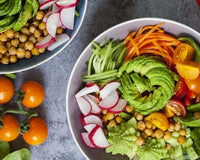Stress is everywhere. However, how you deal and cope with stress is very important. When not addressed, it can lead to chronic stress which can increase the risk of serious conditions such as heart disease.
Luckily, nutrition plays a very important role when it comes to coping with anxiety. Interestingly, proper nutrition and certain foods for anxiety have stress-relieving qualities.
Here are the 9 foods that relieve stress that you should add to your diet to help improve your mental health.

1. Matcha Powder

Matcha powder, originally from East Asia, is a type of green tea that is made by grinding young tea leaves into a bright green powder.
Given that you consume the entire leaf, you receive all the nutrients the leaf provides. For this reason, matcha powder outnumbers the number of antioxidants in regular green tea.
Matcha is loaded with natural compounds, like chlorophyll, L-theanine, caffeine, and more which help you deal with anxiety and stress.
Matcha also has the power to help you feel calm and focused whilst supporting your health and metabolism at the same time. Theanine, a major amino acid in green tea, has been shown to exhibit a stress-reducing effect in mice and humans.

2. Sweet Potatoes

Sweet potatoes are nutritious and delicious root vegetables. They are extremely versatile because of their creamy and sweet taste.
Sweet potatoes are considered to be stress-reducing because they can satisfy the urge you get for carbohydrates and sweets when you are under a great deal of stress. They are packed full of beta-carotene and other vitamins, and the fiber helps your body to process the carbohydrates in a slow and steady manner.

3. Kimchi

Kimchi is a staple side dish in Korean cuisine. It is simply salted and fermented vegetables such as cabbage and radish seasoned with gochugaru, spring onions, garlic, ginger, and jeotgal, etc.
In one study of Sprague-Dawley rats, one group was dosed with kimchi while being exposed to immobilization stress while another group was not fed kimchi. It was found that the ingestion of kimchi completely and partially suppressed these stress-induced changes, including suppressing an increase in the weights of the adrenal glands and a decrease in the weight of the thymus.
4. Artichokes

Artichokes are beautiful vegetables that provide an abundance of nutrients and tastes delicious. Interestingly, the artichoke is actually a flower. The leaves cover a fuzzy center referred to as the “choke”, which sits on top of the heart. Only the innermost leaves are able to be eaten, but you will have to only eat the tender parts.
The heart is edible and is widely used in recipes as it’s meaty, delicious and flavorful.
Artichoke is ranked as the number one vegetable for antioxidants according to the research conducted by the US Department of Agriculture. They help combat oxidative stress which arises due to a buildup of free radicals in the body that are produced as a result of poor lifestyle choices, environmental toxins, chronic stress and more. Antioxidants help combat these free radicals.
Furthermore, one medium-size, cooked artichoke provides more than 27% of the daily value for both folate and vitamin K. Folate is highly linked with serotonin and deficiency in this vitamin can contribute to a depressed mood.
5. Parsley

Parsley is a ubiquitous herb in British, Middle Eastern and even European cooking.
It’s usually used to add flavor to dishes such as soups, salads and seafood. Parsley is also highly nutritious and has been shown to have many powerful health benefits.
This herb is rich in flavonoid antioxidants and vitamin C, which reduce oxidative stress in your body and may lower your risk of cancer. Parsley is particularly rich in flavonoid antioxidants and vitamin C, which reduce oxidative stress in your body and may lower your risk of certain cancers.
In fact, high intake of flavonoids have been shown to reduce the risk of colon cancer.

6. Garlic

Garlic is the king of healing herbs. Garlic is a common ingredient used to flavor food in almost every kitchen and also used in herbal medicine for curing many diseases. Known for its therapeutic properties, garlic is believed to provide many health benefits.
Garlic is a natural detoxifier. Sulphur present in garlic stimulates the liver to make detoxifying enzymes which filter the bad toxins from the bloodstream.
The high concentration of the sulphur compounds in garlic increase levels of glutathione in the body. This is an antioxidant that provides a critical defense system for the protection of cells from many forms of stress.
7. Tahini

Tahini is a paste made from sesame seeds and it is a staple of Middle Eastern and Mediterranean cooking. As for tahini’s nutrition content, it is rich in calcium and protein and provides a great source of copper, zinc, iron and manganese.
This creamy and flavorful spread is also packed with the amino acid L-tryptophan which has been shown to reduce stress, mood swings and anxiety.

8. Broccoli

Broccoli may be the most underrated vegetable. It is packed with an abundance of nutrients.
One cup of cooked broccoli contains twice the amount of vitamin C in a single orange. It is also rich in B vitamins and folic acid which helps relieve stress, anxiety, and depression.
9. Banana

Did you know that eating bananas naturally reduces stress? Well, now you do! Here’s how.
Bananas are natural beta-adrenergic blockers. These blockers are often a pharmaceutical drug, but bananas offer the same effects that these blockers would. Beta blockers help treat anxiety, reduce blood pressure and lower pulse rate. This is done by preventing adrenaline from binding to beta receptors.
Bananas are also high in both the protein tryptophan and the mineral magnesium which work to help increase your serotonin levels and reduce stress levels.











